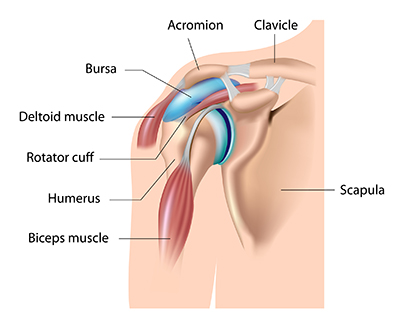Rotator cuff tears are a common cause of pain and disability among adults. It is estimated that annually, almost 2 million Americans will visit a physician because of a rotator cuff problem. The rotator cuff is a group of four muscles that come together as tendons around the ball of the shoulder or the humeral head. The rotator cuff helps hold the humeral head in the socket of the shoulder or the glenoid. It also helps to lift and rotate the arm around the body.
 A rotator cuff tear occurs when the tendon no longer fully attaches to the bone. The presence of a rotator cuff tear can cause pain and weakness in the shoulder. Rotator cuff tears can make regular daily activities difficult and may predispose certain patients to the later development of arthritis. Rotator cuff tears may occur from an isolated traumatic event or from chronic repetitive activity and tendon degeneration. Raising the arm overhead or lifting objects with the involved extremity may produce pain. Symptoms can include pain, weakness, motion loss, or popping around the shoulder. Pain is typically activity related but can occur at rest or during the night. Some rotator cuff tears are not painful but may still result in weakness and other symptoms.
A rotator cuff tear occurs when the tendon no longer fully attaches to the bone. The presence of a rotator cuff tear can cause pain and weakness in the shoulder. Rotator cuff tears can make regular daily activities difficult and may predispose certain patients to the later development of arthritis. Rotator cuff tears may occur from an isolated traumatic event or from chronic repetitive activity and tendon degeneration. Raising the arm overhead or lifting objects with the involved extremity may produce pain. Symptoms can include pain, weakness, motion loss, or popping around the shoulder. Pain is typically activity related but can occur at rest or during the night. Some rotator cuff tears are not painful but may still result in weakness and other symptoms.
Because rotator cuff tears are largely caused by the normal wear and tear that goes along with aging, older patients are at a greater risk of this condition. Studies have shown that 25% of people over the age of 60 have a rotator cuff tear. Younger patients who engage in repetitive overhead activity or lifting are also at risk. Recent literature has shown an increased risk in smokers, diabetics, and those with elevated cholesterol.
The treatment for rotator cuff tears is dependent on the characteristics of the tear (full or partial), type of clinical symptoms, and individual patient goals. Nonsurgical management includes rest and anti-inflammatory medication such as naproxen or ibuprofen. Activity modification should include the avoidance of painful positions. Physical therapy may help with pain relief and further injury prevention by addressing surrounding muscular deficits. An injection may be indicated to help with pain relief. Many types of rotator cuff tears respond well to nonoperative treatment.
Surgical treatment for rotator cuff tears may be indicated following a traumatic injury, failed nonoperative management, or for certain full thickness tears. Surgery usually involves reattachment of the torn tendon to the bone; however, partial tears may only require a debridement or smoothing of the torn tissue. Additional shoulder problems such as bone spurs, cartilage disease, or other soft tissue problems may be treated at the same time of surgery. These procedures are usually performed as an outpatient without an overnight stay. Surgery may be performed arthroscopically through small incisions or with the use of an open incision. Both methods have shown good results for pain relief, strength, and patient satisfaction.
If you have shoulder pain or concern for a rotator cuff tear, please give us a call. We would be happy to help get you back to the activities you enjoy the most.
